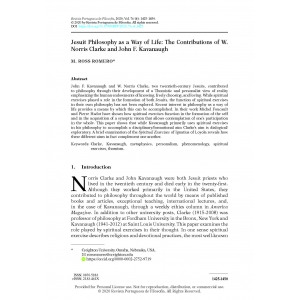Ambury, James, Kathleen Wallace, and Tushar Irani, eds. “Special Issue: Philosophy As a Way of Life.” Metaphilosophy 51, no. 2–3 (April 2020): 159–482. https://doi.org/10.1111/meta.12377.
Bett, Richard. How to Be a Pyrrhonist: The Practice and Significance of Pyrrhonian Skepticism. Cambridge University Press, 2019.
Carlo, William E. The Ultimate Reducibility of Essence to Existence in Existential Metaphysics. The Hague: Martinus Nijhoff, 1966.
Clarke, Norris. “Reply To Stephen Long.” The Thomist: A Speculative Quarterly Review 61 (October 1997): 617–24. https://doi.org/doi.org/10.1353/tho.1997.0006.
Clarke, W. Norris. Person and Being. Milwaukee, W.I.: Marquette University Press, 1993.
Clarke, W. Norris. “Person, Being, and St. Thomas.” In Explorations in Metaphysics: Being-God-Person, 211–28. Notre Dame: Notre Dame University Press, 1994. https://doi.org/10.2307/j.ctvpj74zd.13.
Clarke, W. Norris. The One and the Many: A Contemporary Thomistic Metaphysics. Notre Dame: Notre Dame University Press, 2011.
Clarke, W. Norris. The Philosophical Approach to God: A New Thomistic Perspective. New York: Fordham University Press, 2007.
Clarke, W. Norris. “The Self as Source of Meaning in Metaphysics.” The Review of Metaphysics 21, no. 4 (June 1968): 597–612.
Crosby, John. “The Thomistic Personalism of Norris Clarke, S.J.” Quaestiones Disputate 6, no. 1 (Fall 2015): 33–42.
Duns, Ryan G. Spiritual Exercises for a Secular Age: Desmond and the Quest for God. Notre Dame: Notre Dame University Press, 2020.
Foucault, Michel. Power/Knowledge: Selected Interviews and Other Writings 1972-1977. Translated by Colin Gordon, et. al. New York: Vintage Books, 1980.
Foucault, Michel. “Technologies of the Self.” In Ethics, Subjectivity and Truth: Essential Works of Foucault, 1954-1984, edited by Paul Rabinow, 223–51. New York: New Press, 1997.
Ganss, George, trans. The Spiritual Exercises of Saint Ignatius. Chicago: Loyola Press, 1992.
Grimm, Stephen R., and Caleb Cohoe. “What Is Philosophy as a Way of Life? Why Philosophy as a Way of Life?” European Journal of Philosophy, 2020, 1–16. https://doi.org/10.1111/ejop/12562.
Hadot, Pierre. Philosophy as a Way of Life. Translated by Michael Chase. Oxford: Blackwell Publishing, 1995.
Hadot, Pierre. Plotinus or Simplicity of Vision. Translated by Michael Chase. Chicago and London: University of Chicago Press, 1993.
Hadot, Pierre. The Present Alone Is Our Happiness: Conversations with Jeannie Carlier and Arnold I. Davidson. Translated by Marc Djaballah and Michael Chase. Second Edition. Stanford, CA: Stanford University Press, 2011.
Hadot, Pierre. What Is Ancient Philosophy? Translated by Michael Chase. Cambridge, MA: Belknap Press, 2004.
John Paul II. “Fides et Ratio.” The Holy See, September 14, 1998. W2. vatican.va/content/john-paul-ii/en/encyclicals/documents/hf_jp-ii_enc_14091998_fides-et-ratio.html.
Kavanaugh, John F. “A Personalist Lent.” America Magazine. February 19, 2007. https://www.americamagazine.org/issue/603/columns/personalist-lent.
Kavanaugh, John F. Faces of Poverty, Faces of Christ. Maryknoll, NY: Orbis Books, 1991.
Kavanaugh, John F. Following Christ in a Consumer Society: The Spirituality of Cultural Resistance. 25th Anniversary. Maryknoll, NY: Orbis Press, 2006.
Kavanaugh, John F. Human Realization: An Introduction to the Philosophy of Man. New York: Corpus Books, 1971.
Kavanaugh, John F. Who Count as Persons?: Human Identity and the Ethics of Killing. Washington, D.C.: Georgetown University Press, 2001.
Long, Stephen A. “Personal Receptivity and Act: A Thomistic Critique.” The Thomist: A Speculative Quarterly Review 61, no. 1 (January 1997): 1–31. https://doi.org/10.1353/tho.1997.0044.
Paternostro, David C. “Getting Personal: The Philosophy of W. Norris Clarke, S.J.” America Magazine. April 29, 2015. https://www.americamagazine.org/issue/getting-personal.
Pavur, Claude. In the School of Ignatius: Studious Zeal and Devoted Learning. Boston College: Institute of Jesuit Sources, 2019.
Rahner, Hugo. Ignatius The Theologian. Translated by Michael Barry. San Francisco: Ignatius Press, 1964.
Schaeffer, Matthew. “The Thick-Esse/Thin Essence View in Thomistic Personalism.” American Catholic Philosophical Quarterly 89, no. 2 (2015): 223–51. https://doi.org/10.5840/acpq201531047.
Sluhovsky, Moshe. Becoming a New Self: Practices of Belief in Early Modern Catholicism. Chicago: University of Chicago Press, 2017.









